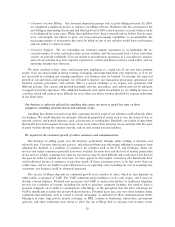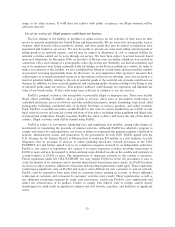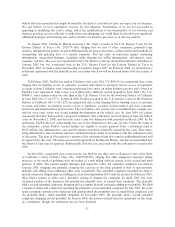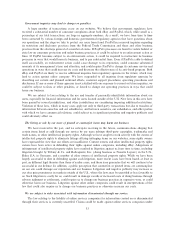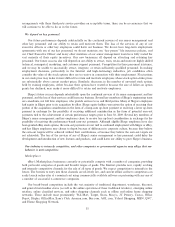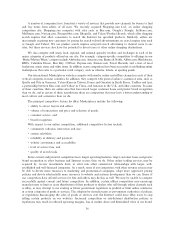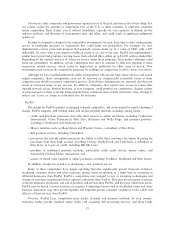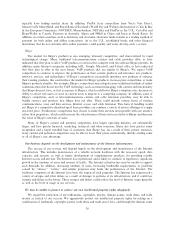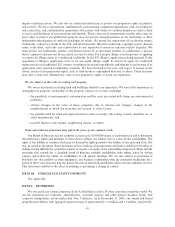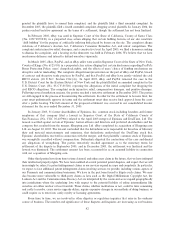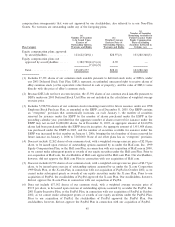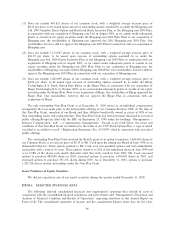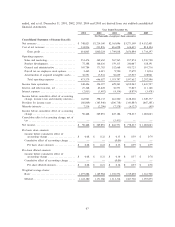eBay 2005 Annual Report Download - page 42
Download and view the complete annual report
Please find page 42 of the 2005 eBay annual report below. You can navigate through the pages in the report by either clicking on the pages listed below, or by using the keyword search tool below to find specific information within the annual report.typically have leading market share. In addition, PayPal faces competition from Visa's Visa Direct,
MasterCard's MoneySend, and Royal Bank of Scotland's World Pay and Webpay International's Click & Buy
in the European Community, NOCHEX, Moneybookers, NETeller and FirePay in the U.K., CertaPay and
HyperWallet in Canada, Paymate in Australia, Alipay and 99Bill in China and Inicis in South Korea. In
addition, in certain countries, such as Germany and Australia, electronic funds transfer is a leading method of
payment for both online and offline transactions. As in the U.S., established banks and other financial
institutions that do not currently offer online payments could quickly and easily develop such a service.
Skype
The market for Skype's products is also emerging, intensely competitive, and characterized by rapid
technological change. Many traditional telecommunications carriers and cable providers offer, or have
indicated that they plan to offer, VoIP products or services that compete with the software Skype provides. In
addition, many Internet companies, including AOL, Google, Microsoft, and Yahoo! offer, or have indicated
that they plan to offer in the near future, VoIP products that are similar to Skype's. We expect VoIP
competitors to continue to improve the performance of their current products and introduce new products,
software, services, and technologies. If Skype's competitors successfully introduce new products or enhance
their existing products, this could reduce the market for Skype's products, increase price competition, or make
Skype's products obsolete. For example, Skype's competitors may integrate more traditional methods of online
communication that do not involve VoIP technology, such as instant messaging, with content and functionality
that Skype does not have, or that is superior to Skype's, which could lower Skype's adoption rates, decrease its
ability to attract new users or cause its current users to migrate to a competing company. In addition, some of
Skype's competitors, such as telecommunications carriers and cable television providers, may be able to
bundle services and products that Skype does not offer. These could include various forms of wireless
communications, voice and data services, Internet access, and cable television. This form of bundling would
put Skype at a competitive disadvantage if these providers can combine a variety of service offerings at a single
attractive price. Furthermore, competitors may choose to make their services interoperable with one another,
rather than proprietary, which could increase the attractiveness of their services relative to Skype and decrease
the value of Skype's network of users.
Many of Skype's current and potential competitors have longer operating histories, are substantially
larger, and have greater financial, marketing, technical, and other resources. Some also have greater name
recognition and a larger installed base of customers than Skype has. As a result of their greater resources,
many current and potential competitors may be able to lower their prices substantially, thereby eroding some
or all of Skype's cost advantage.
Our business depends on the development and maintenance of the Internet infrastructure.
The success of our services will depend largely on the development and maintenance of the Internet
infrastructure. This includes maintenance of a reliable network backbone with the necessary speed, data
capacity, and security, as well as timely development of complementary products, for providing reliable
Internet access and services. The Internet has experienced, and is likely to continue to experience, significant
growth in the numbers of users and amount of traffic. The Internet infrastructure may be unable to support
such demands. In addition, increasing numbers of users, increasing bandwidth requirements, or problems
caused by ""viruses,'' ""worms,'' and similar programs may harm the performance of the Internet. The
backbone computers of the Internet have been the targets of such programs. The Internet has experienced a
variety of outages and other delays as a result of damage to portions of its infrastructure, and it could face
outages and delays in the future. These outages and delays could reduce the level of Internet usage generally
as well as the level of usage of our services.
We may be unable to protect or enforce our own intellectual property rights adequately.
We regard the protection of our trademarks, copyrights, patents, domain names, trade dress, and trade
secrets as critical to our success. We aggressively protect our intellectual property rights by relying on a
combination of trademark, copyright, patent, trade dress and trade secret laws, and through the domain name
38


